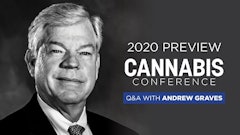
One of the great problems facing hemp growers in early 2020 is the lack of processing facilities around the U.S., a supply chain bottleneck that puts farmers without a clear marketplace for their product at a distinct disadvantage. Whether you’re working in Virginia or elsewhere, the supply chain needs a boost.
To get things moving in Halifax County—a southern, inland stretch of land that shares a border with North Carolina—the Virginia Tobacco Region Revitalization Commission approved a $250,000 grant on Tuesday, Jan. 7, to bring a hemp processing business to the area. The enterprise is code-named “Project Phoenix.”
Halifax County Industrial Development Authority Executive Director Brian Brown could not offer a comment, saying only that this remained an unannounced economic development project. But according to news reports from the area, the IDA will adapt a local building to be leased to a private hemp processing company. Further incentive packages continue to be negotiated.
In the interim, the news brings a tentative sigh of relief to a corner of Virginia dominated by agricultural businesses. Virginia farmers were licensed to grow 135 acres of hemp in 2018, but interest in the crop quickly picked up. In 2019, farmers were licensed to grow 11,000 acres. Project Phoenix is seen as a way of galvanizing that interest in the coming years—and offering something of a landing pad to the regional supply chain. According to the Danville Register and Bee, the Project Phoenix facility “is projected to purchase and process upward of $50 million worth of hemp from Virginia farmers within the first three years.”
Reporter Caleb Ayers points out that the grant application specifically cites “68 hemp producers at an average of 15 acres apiece” as a figure for what to expect from Project Phoenix when it gets up and running.
That capacity for taking on new contracts will give farmers a better shot at finding a buyer for their product. Many Virginia hemp growers (and hemp growers working in other states) ended the 2019 season without a contract on which to pin their harvested biomass.
"Having a processing facility, that's really going to make it easier and more efficient for producers to be able to take their hemp to be harvested," Virginia Cooperative Extension Agent Rebekah Slabach told WSET.




















